Contributed by – Healthians Team
Can you dissolve 10 spoons of sugar in just half a cup of water? That’s impossible because the quantity of fluid is too low for that amount of sugar to dissolve. A similar situation can happen in your body as well which leads to the formation of kidney stones. Basically, your kidneys are responsible for removing all the waste and fluid from your body to make urine. But sometimes, when you have too much waste and too little fluid, all the waste starts sticking together forming a stone.
The formation of kidney stones is a fairly common condition. Still, many people are ignorant of it and fail to notice their symptoms in a timely fashion. So, here’s everything that you should know about kidney stones and kidney stone pain so that you can save yourself from all the suffering that it can cause.
Kidney stones
Kidney stones also called renal calculi, nephrolithiasis or urolithiasis, are basically hard deposits of minerals and salt. They often originate in your kidneys but can develop in any part of the urinary tract (kidneys, ureters, bladder, urethra). When there’s too much waste in your body and too little liquid, crystals begin to form. These crystals attract other elements to join and form a solid that continues to get larger unless it is passed out of the body with urine.
Once a stone is formed, it may stay in the kidney or travel down the urinary tract into the ureter. Sometimes, tiny stones move out of the body without causing much pain. Other times, the pain can be so severe that immediate medical attention might be needed. Still, they don’t normally cause any serious damage if recognized timely.
[Also read – Guidebook to manage kidney diseases]
Types of kidney stones
Based on the chemicals that lead to the formation of a stone, kidney stones can be of various types. They are:
- Calcium stones – Calcium stones are the most common types of kidney stones. They are made of calcium oxalate – a substance made daily by our liver or absorbed from certain foods (nuts, chocolates, beets). Calcium phosphate may also lead to the formation of calcium stones. However, don’t be confused about consuming calcium. Calcium actually prevents the formation of stones as before entering the kidney, it binds with oxalate.
- Struvite stones – Most common in women, struvite stones form because of urinary tract infections. They grow quickly and become large, causing urinary obstruction. They are often a result of kidney infection.
- Uric acid stones – Mostly found in men than women, uric acid stones form when urine is too acidic. Those with chronic diarrhea, malabsorption, diet high in protein, and those with diabetes or metabolic syndrome are more at risk.
- Cystine stones – Cystine stones are rare. Mostly they are seen in people with a hereditary disorder called cystinuria which causes kidneys to excrete high amounts of specific amino acids.
Symptoms that you have kidney stones
Generally, the larger the kidney stone, the more noticeable are its symptoms. These include:
- Severe pain on the side of the lower back
- Stomach pain that doesn’t go away
- Blood in the urine
- Nausea and vomiting
- Fever and chills
- Urine that looks cloudy and smells bad
- Pain and burning sensation while urinating
Note that pain caused by a stone can change based on the location it has moved to.
[Also read – 6 golden rules to keep your kidneys healthy]
Kidney stones risk factor
Some people are more likely to develop kidney stones than others. Following conditions can increase your likelihood of having them –
- You’ve had kidney stones before.
- You have a family history of kidney stones.
- You don’t drink enough water.
- Your diet is high in protein, sodium or sugar.
- You are overweight or obese.
- You underwent gastric bypass surgery or any other intestinal surgery.
- You have polycystic kidney disease.
- You have a condition that increases the levels of cystine, oxalate, uric acid or calcium in your urine.
- You have a condition that causes swelling or irritation in your bowel or joints.
- You take certain supplements or medications that can increase the risk.
When to see a doctor
You should seek immediate medical attention if you have any of the below signs:
- Pain so intense that you can’t sit comfortably.
- Pain accompanied by nausea, vomiting, fever and chills.
- Urine has blood.
- Difficulty in passing urine.
With medications or a simple procedure, kidney stones can be treated. All you need to do is notice the signs timely and consult with a doctor. It will not only save you from some serious damage, you will also experience less kidney stone pain which can be the most frightening factor of having kidney stones.




